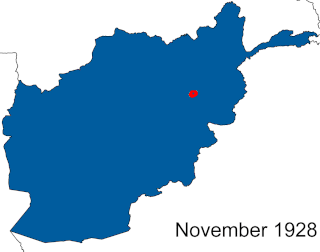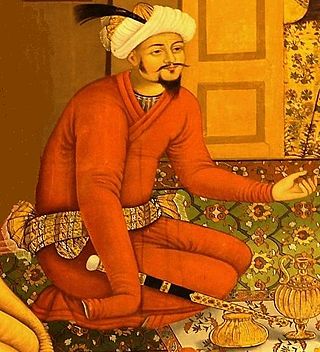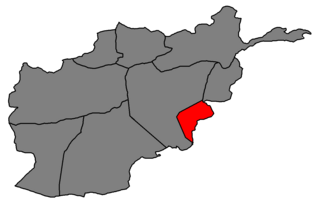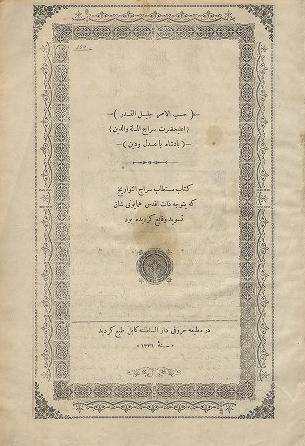Related Research Articles

The Afghan Civil War was fought from 14 November 1928 to 13 October 1929. Rebelling, and subsequently governing Saqqawist (Saqāwīhā) forces under Habibullāh Kalakāni fought against various opposing tribes and rival monarchs in the Kingdom of Afghanistan, among whom Mohammed Nādir Khān eventually achieved a preponderant role. Despite early successes, such as the capture of Kabul and defeat of Amanullah Khan on 17 January 1929 or the capture of Kandahar on 3 June, the Saqqawists were eventually deposed by anti-Saqqawist forces led by Nadir on 13 October 1929, leading to Nadir's ascension as King of Afghanistan, who ruled until his assassination on 3 November 1933.

Emir Dost Mohammad Khan Barakzai, nicknamed the Amir-i Kabir, was the founder of the Barakzai dynasty and one of the prominent rulers of Afghanistan during the First Anglo-Afghan War. With the decline of the Durrani dynasty, he became the Emir of Afghanistan in 1826. He was the 11th son of Payendah Khan, chief of the Barakzai Pashtuns, who was killed in 1799 by King Zaman Shah Durrani.

Habibullah Kalakani, derided by Pashtun as "Bacha-ye Saqao" was the ruler of Afghanistan from 17 January to 13 October 1929, and as well as a leader of the Saqqawists. During the Afghan Civil War, he captured vast swathes of Afghanistan and ruled Kabul during what is known in Afghan historiography as the "Saqqawist period". He was an ethnic Tajik. No country recognized Kalakani as ruler of Afghanistan.

Valī Muḥammad Khān the son of jani bek was a leader of the Ashtarkhanid dynasty in the Khanate of Bukhara from 1605–1611 AD.

Faiz Muhammad Kāteb also known as Kāteb (کاتب) was a writer and historian. He was Afghan court chronicler, a skilled calligrapher and secretary to Habibullah Khan from 1901 to 1919.

Mohammad Afzal Khan was the governor of Afghan Turkestan from 1849 to 1863 and Emir of Afghanistan from May 1866 to October 1867. The oldest son of Dost Mohammad Khan, Afzal Khan was born in Kabul in 1815. His father died on 9 June 1863 followed by a civil war between Dost Mohammad Khan's sons. In May 1866 he seized power from his brother Sher Ali Khan and captured Kabul. A year later he contracted cholera and died on 7 October 1867. Following Afzal Khan's death, Mohammad Azam Khan was proclaimed Amir of Afghanistan. He was an ethnic Pashtun and belonged to the Barakzai tribe.
Takhteh Pol, also known as Takhtapul, is a village in Balkh Province in northern Afghanistan. It was created in by Afzal Khan as a cantonment after the Afghan conquest of the Balkh Wilayat in 1849-1850. Balkh was in ruins, so with materials from the ruined town of Balkh, he established the city of Takhtapul. Gardens and courts were created as well. Within three years the city was established.

Mohammad Nadir Shah was King of Afghanistan from 15 October 1929 until his assassination in November 1933. Previously, he served as Minister of War, Afghan Ambassador to France, and as a general in the Royal Afghan Army. He and his son Mohammad Zahir Shah, who succeeded him, are part of the Musahiban.

The Khost rebellion, also known as the 1924 Mangal uprising, the Khost revolt or the Mangal Revolt was an uprising against the Westernization and modernizing reforms of Afghanistan’s king, Amanullah Khan. The uprising was launched in Southern Province, Afghanistan, and lasted from March 1924 to January 1925. It was fought by the Mangal Pashtun tribe, later joined by the Sulaiman Khel, Ali Khel, Jaji, Jadran and Ahmadzai tribes. After causing the death of over 14,000 Afghans, the revolt was finally quelled in January 1925.

Mohammad Azam Khan was the Emir of Afghanistan from October 7, 1867, to August 21, 1868. He was born in 1820 and was the fifth son of Dost Mohammed Khan. He was an ethnic Pashtun and belonged to the Barakzai tribe. Azam Khan succeeded his brother Mohammad Afzal Khan after the latter's death on October 7, 1867. Sher Ali Khan was reinstated as Amir of Afghanistan and his forces captured Kabul on August 21, 1868. Sher Ali himself entered Kabul on September 8, 1868. Mohammad Azam Khan fled to Sistan and then to Iran, where he died in 1870.

Siraj al-Tawarikh also spelled as Siraj al-Tavarikh, Sirāj al-Tawārīkh and Sirāj al-Tavārīkh, is a book on 18th and 19th century Afghan history by Faiz Mohammad Katib Hazara. The author was an Afghan court chronicler and secretary in the court of Amir Habibullah Khan from 1901 to 1919.
The Battle of Kafir Qala was fought in June 1818 between Iran and the Durrani Empire.

Slavery in Afghanistan was present in the post-Classical history of Afghanistan, continued during the Middle Ages, and persisted into the 1920s.

The Saqqawists were an armed group in Afghanistan who were active from 1924 to 1931. They were led by Habibullāh Kalakāni, and in January 1929, they managed to take control of the capital of the Kingdom of Afghanistan, Kabul, reestablishing the Emirate of Afghanistan. Following military reversals in the Afghan Civil War (1928–1929), they were forced out of the capital in October 1929. Saqqawist activity ended in 1931.

The Emirate of Afghanistan was an unrecognized state ruled by the Saqqawists that existed from January to October 1929. Habibullāh Kalakāni became the state's only emir on 18 January 1929. After the fall of Kalakāni on 13 October 1929, the Emirate ended.
Kuchkunji Khan (1452–1531) - a descendant of the Timurid Mirzo Ulugbek, the third representative of the Uzbek dynasty of Shaybanids, who ruled in the Bukhara Khanate in 1512–1531.
Bāqī Muḥammad K̲h̲ān was the son of Jani Muhammad/Jani Bek and a leader of the Ashtarkhanid dynasty in the Khanate of Bukhara from 1599–1605 AD.
Sufi Eslam, also known as Islam Shaykh was an Uzbek Naqshbandi pir in Herat who established a convent in Karokh. He famously led the Afghans during the Battle of Shahdih in 1807 and encouraged Firuz al-Din Mirza to attack Iran. He died during the battle but his movement in Karokh survived after his death. He was a controversial figure during his lifetime and still to this day his practices are the subject of much debate by historians.
References
- ↑ Directory of Foreign Area Fellows (Foreign Area Fellowship Program, 1973), p. 131.
- ↑ Robert D. McChesney (2005). "Robert D. McChesney". New York University . Retrieved 2006-08-13.